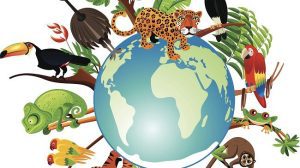As we mark 22 years since the United Nations General Assembly officially adopted May 22 as the International Day of Biodiversity (IDB) in December 2000, it is about time we rethink biodiversity and what it means to us.

Biodiversity Day is a reminder that we cannot exist all by ourselves. Despite all our technological advances, we are completely dependent on healthy and vibrant ecosystems for our water, food, medicines, clothes, fuel, shelter and energy.
The theme for this year, “Building a shared future for all life”, is meant to continue developing momentum and support the post-2020 global biodiversity framework. If we take an in-depth introspection at our dependence on natural resources, we will appreciate that biodiversity remains the answer to several sustainable development challenges.
From nature-based solutions to climate, health issues, food and water security, and sustainable livelihoods, biodiversity is the foundation upon which we can build forward or build back better.
Biological diversity is often understood in terms of the wide variety of plants, animals and microorganisms, but it also includes genetic differences within each species — for example, between varieties of crops and breeds of livestock — and the variety of ecosystems (lakes, forest, deserts, agricultural landscapes) that host multiple kinds of interactions among their members (humans, plants, animals).
We share this planet with about 8.7 million different forms of life. According to the United Nations, Fish provide 20 per cent of animal protein to about 3 billion people. Over 80 per cent of the human diet is provided by plants. As many as 80 per cent of people living in rural areas in developing countries rely on traditional plant‐based medicines for basic healthcare.
Nature is underpriced because a lot from nature comes free and the services nature provides go undetected in economics. Sadly, Biodiversity is declining more quickly than at any time in human history. For decades our demands on nature have far exceeded its ability to supply us on a sustainable basis, we’ve been taking nature for granted and the solution starts with understanding and accepting a simple truth, our respective economies are embedded within nature not external to it.
Countries must begin to place a premium on the value of resources within their geographical boundaries; this is possible by exploring and understanding the economics of biodiversity. Beyond thinking of fossil fuel products as marketable income, biodiversity through various components is an even more valuable and sustainable option. Development entities need to stop evaluating the wealth of nations via increasing GDP while ignoring the sharp decline in natural capital growth.
As the Dasgupta report puts it, “Humanity faces an urgent choice. Continuing down our current path – where our demands on Nature far exceed its capacity to supply – presents extreme risks and uncertainty for our economies. Sustainable economic growth and development require us to take a different path, where our engagements with Nature are not only sustainable but also enhance our collective wealth and well-being and that of our descendants.”
Clearly, the loss of biodiversity threatens all, including our health. It has been proven that biodiversity loss could expand zoonoses – diseases transmitted from animals to humans- while, on the other hand, if we keep biodiversity intact, it offers excellent tools to fight against pandemics. Biological diversity is a global asset of tremendous value to future generations; hence, we must be mindful of how certain human activities are significantly reducing the number of species.
By ‘Seyifunmi Adebote (seyi@climatetalkpodcast.com)
